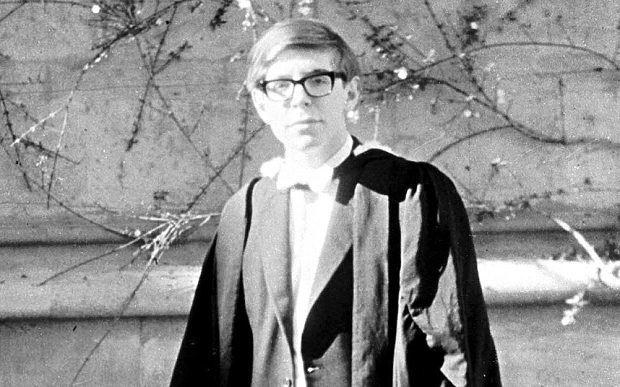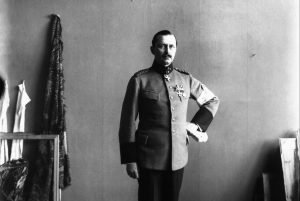With a heavy workload, financial stress, and balancing a social life, college can at times seem like a drag. Is the stress and hard work of all of this in college really worth the piece of paper at the end of these four or possibly six or eight years of toil? Just as millions of college students have experienced, renowned physicist Stephen Hawking also struggled to find meaning in his education. It is hard to believe that someone that is largely considered one of the greatest thinkers of modern times could possibly think this of his college years. When your life is put on a timer, school is the last of your priorities.

At only seventeen years old, Stephen Hawking entered the prestigious Oxford University and wanted to study physics and math, but to keep his father happy he ended up studying physics with chemistry rather than mathematics. During his first year, Hawking battled with feelings of isolation, as he did not make many friends, as his classmates were much older than he was.1 He thrived but was not very happy most of the time he was there. Loneliness is a very common thing for college students to go through, as for many, it is the first time away from home. Frankly, adjusting can be difficult, but more so at such a competitive school like Oxford.
However, things began to look up for the future scientist as, during his last year an an undergraduate, he joined the rowing club and went to parties with this friends.2 With his undergraduate degree in the books, Hawking turned his focus on cosmology, a sub-section of astronomy that is dedicated to discovering the origins of our universe. When he began his graduate career in the mid-sixties, Hawking slowly began to lose control of his body. For some reason, he was getting clumsier and clumsier, and fell for no reason at all.3
After a visit with a specialist, Hawking was diagnosed with amyotrophic lateral sclerosis, otherwise known as ALS or Lou Gehrig’s disease. The disease slowly breaks down the tissue in the nervous system that affects movement.4 While brain function was not affected at all, Hawking slowly but surely would lose control of his body until he died. After his diagnosis, he was only given two-and-a-half years to live.5 His new-found academic happiness was short-lived as he was now living only to die. His years as an undergraduate were now seemingly wasted, as he could not finish his PhD at his new school Cambridge in the limited amount of time he had left.

While initially depressed, a series of events led Hawking to use his limited time wisely. First, while in the hospital, he saw a young boy across from him die from leukemia, which made him realize that while he may have it bad, others have it a lot worse.6 Secondly, he had a dream that he was going to be executed, and he came to the realization that, while he was initially bored with life, there was still a lot left that he wanted to do.7 Lastly and most importantly, he became engaged to his first wife, Jane Wilde. Reflecting back on her significance, Hawking said, “the engagement changed my life. It gave me something to live for. It made me determined to live. Without the help that Jane has given I would not have been able to carry on, nor would I have had the will to do so.”8 Cambridge wanted to help Hawking continue his work, and while they could not make the exception of letting him get his PhD early, they helped in the quality of his life by helping him find closer housing, since Hawking could no longer walk far.9
His disease developed much slower than expected, and with everything falling into place for Hawking, he began making his landmark discoveries in the fields of cosmology and astrophysics. He suggested that the universe must start at a singularity (a point in time where the matter in the universe is infinitely dense) and from then on explodes with a “big bang.”10 Backed by Einstein’s theory of general relativity, it was very difficult to argue with the math behind the landmark theory.

A major part of Hawking’s life was that he wanted to make physics accessible to the everyday person. With this in mind, he wrote books such A Brief History of Time and Black Holes and Baby Universes, as well as help write and produce science movies such as The Theory of Everything. He also refused to let his disability stop him from doing whatever he tried, and to live as normal a life as possible, and take as many opportunities as he could.11 Sadly, we lost a great mind as he passed away on March 14, 2018, which just so happened to coincide with Einstein’s birthday. Hawking defied odds throughout his career as he outlived his initial “death sentence” by more than fifty years. While he can no longer provide further discoveries, he has brought inspiration to a new generation of physicists. Many look up to Newton and Einstein and say they want to be like them, but now many look up to Hawking and say the same.
- Major 21st-Century Writers, 2005, s.v. “Hawking, Stephen W(illiams) (1942-).” ↵
- Major 21st-Century Writers, 2005, s.v. “Hawking, Stephen W(illiams) (1942-).” ↵
- Major 21st-Century Writers, 2005, s.v. “Hawking, Stephen W(illiams) (1942-).” ↵
- L. Fleming Fallon Jr, An Overview of Lou Gehrig’s Disease (ALS), in Lou Gehrig’s Disease, edited by Sylvian Engdahl (Detroit: Greenhaven Press, 2012), 16-24. ↵
- Major 21st-Century Writers, 2005, s.v. “Hawking, Stephen W(illiams) (1942-).” ↵
- Stephen Hawking, A World Famous Scientist Tells about His Life With ALS, in Lou Gehrig’s Disease (Detroit: Greenhaven Press, 2012), 101. ↵
- Stephen Hawking, A World Famous Scientist Tells about His Life With ALS, in Lou Gehrig’s Disease (Detroit: Greenhaven Press, 2012), 101. ↵
- Major 21st-Century Writers, 2005, s.v. “Hawking, Stephen W(illiams) (1942-).” ↵
- Stephen Hawking, A World Famous Scientist Tells about His Life With ALS, in Lou Gehrig’s Disease (Detroit: Greenhaven Press, 2012), 103. ↵
- UXL Encyclopedia of World Biography, 2003, s.v. “Hawking, Stephen,” by Laura B. Tyle. ↵
- Stephen Hawking, A World Famous Scientist Tells about His Life With ALS, in Lou Gehrig’s Disease (Detroit: Greenhaven Press, 2012), 100. ↵



63 comments
Jose Chaman
Stephen Hawking will always be a physics hero. His mental capacity over passed that of any human being, and thanks to him the universe will never be an unknown place. His history is really moving, and it shows us that our limitations should not prevent us from contributing to society. This article developed an excellent work recounting the main aspects of Hawking’s life, in addition to giving us a motivational message.
Michael Lazcano
Stephen Hawking is arguably one of the greatest minds of our generation, and in history. His revolutionary theories of space and time have permeated into pop culture and of course the world of science. His work was instrumental to what we do today, and what we research, making him a huge foundation for other peoples work. He has also had numerous movies over himself and possible theories he has presented to the world.
Vania Gonzalez
Stephen Hawking’s story has always been interesting to read and learn about because it is very inspirational to many people across the world. His determination to finish school and do something in this world after finding out his life was almost over is truly amazing. This article is really great and it tells the story well, good job.
Samantha Ruvalcaba
Stephen Hawking’s story has always been one to amaze me and keep me invested. Again, I enjoyed how you included his relationship with his wife and how that changed his life, but you waste no time continuing with the article. Very well-written and executed. Hawking is indeed someone many scientists and theorists look up to, and for very good reason.
Sharriah Martinez
I have seen a couple of documentaries on Steven Hawking. I have also seen the movie “The theory of Everything” He was an amazing scientist but most importantly an amazing man. He did not let his disabilities get in his way, he instead made new discoveries and worked hard to succeed. He was an inspiring man, who overcame many obstacles.
Emily Velazquez
Hawking was not only a great person but, a great scientist. He was someone who showed perseverance through it all, even till the very end. As the article states, he defied his odds of living with the disease by more than fifty years. This is impressive. I loved reading this article because I learned about Hawking that I did not know before. Thank you.
Diego Terrazas
Hawking is a major inspiration. He taught us even with a given time limit to live, we can still at least try to make the most of the time we have left. I admire him for loving physics and trying to show the wonders of physics to the common folk. It is hard to simplify and explain high-level physics especially with recent discoveries.
Ryan Estes
I remember watching these videos with Stephen Hawking in astronomy last year. They were pretty interesting, and some of the experiments they ran with people mixed with Hawking’s insight were mind-blowing. However, it did feel like some of the experiments were staged. I find the title of Hawking’s book “A Brief History of Time” a little amusing; the history of time is anything but brief. The history of time, if I am thinking correctly, is the longest possible period of history we can discuss.
Eric Ortega Rodriguez
Stephen Hawking is definitely someone anyone can look up to. Not only for his incredible knowledge but also for his determination to overcome adversity. I find it hard to believe how many physical limitations Hawking had to go through, yet that never limited his mind’s capability. I also find interesting how he was able to outlived his initial “death sentence”. Overall, this was a very fascinating and well written article. Good work.
Octaviano Huron
Thank you for writing an eloquent article about Dr. Stephen Hawking, and providing background information about his discoveries in physics. His theory of a “space-time singularity” is a perfect example of his intelligence and brilliance, albeit fighting for his quality of life against a crippling disease. His work was a true testament to the greatest minds on Earth, and especially to those afflicted with ALS.